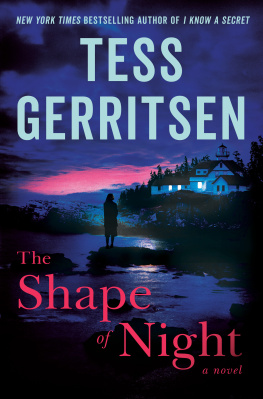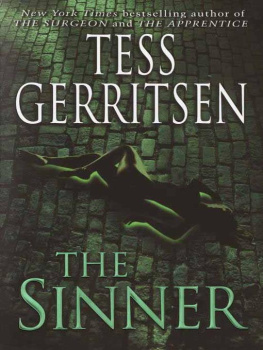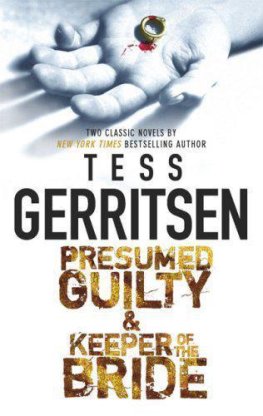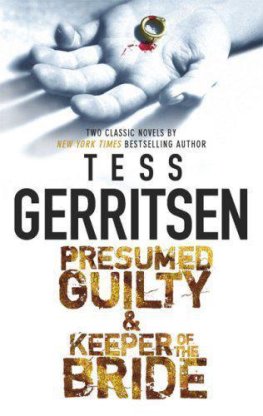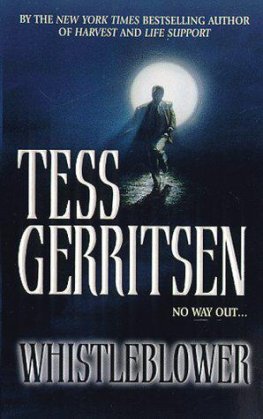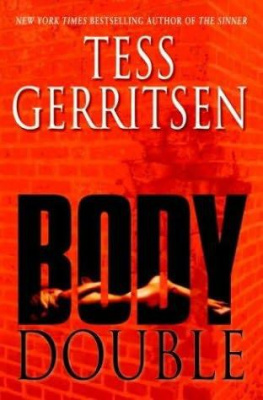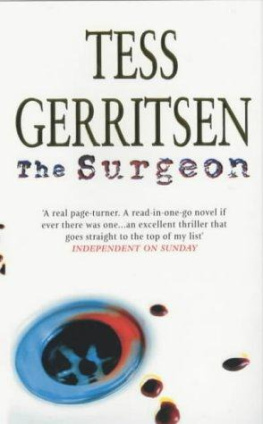
Tess Gerritsen
Bloodstream
TRANQUILITY, MAINE, 1946
If she was still enough, quiet enough, he would not find her. He might think he knew all her hiding places, but he had never discovered her secret niche, this small hollow in the cellar wall, concealed by the shelves of her mothers canning jars. As a young child she had easily slipped into this space, and every game of hide and seek had found her curled up in her lair, giggling at his frustration as he thumped from room to room, searching for her. Sometimes the game Would go on so long shed fall asleep, and would awaken hours later to the Sound of her mothers voice worriedly calling her name.
Now here she was again, in her cellar hiding place, but she was no longer a child. She was fourteen and barely able to squeeze into the niche. And this was no lighthearted game of hide and seek.
She could hear him upstairs, roaming the house, searching for her. He rampaged from room to room, cursing, slamming furniture to the floor Please, Please, please. Someone help us. Someone make him go away.
She heard him roar out her name: IRIS! His footsteps creaked into the kitchen.
Approached the cellar door. Her hands balled into tight fists, and her heart was a banging drum.
I am not here. I am far away, escaping, soaring into the night sky
The cellar door flew open, slamming into the wall. Golden light shone down, framing him in the open doorway at the top of the stairs.
He reached up to pull on the light chain and the bare bulb came on, dimly illuminating the cavernous cellar. Cowering behind the jars of home-canned tomatoes and cucumbers, Iris heard him descend the steep stairs, each creak bringing him toward her. She pressed deeper into the hollow, flattening herself against the crumbling stone and mortar, and closed her eyes, willing herself to be invisible. Through the slamming of her own heartbeat she heard him reach the bottom of the steps.
Dont see me. Dont see me.
The footsteps moved right past the canning shelves and headed toward the far end of the cellar. She heard him kick over a box. Empty jars shattered on the stone floor. Now he was circling back, and she could hear his harsh breathing, punctuated by animal grunts. Her own breaths were coming short and fast, her hands clenched so tightly she thought her bones would shatter. The footsteps moved to the canning shelves and stopped.
Her eyes shot open, and through a chink between two jars she saw him standing right in front of her. She had slid down until her gaze was level with his belt.
She cringed even lower, dropping as far below his line of sight as she could. He took a jar off the shelf and smashed it to the ground. The smell of pickles, sharp and vinegary, rose up from the stone floor. He reached for a second jar, then suddenly put it back, as though a better thought had occurred to him. He turned and walked up the cellar steps, yanking the light chain as he exited.
Once again she was in darkness.
She realized she had been crying. Her face was wet, sweat mingling with tears, but she didnt dare release even a whimper.
Upstairs the footsteps creaked toward the front of the house and then there was silence.
Had he left? Had he finally gone away?
She remained frozen, not daring to move. The minutes went by. She counted them off slowly in her head. Ten. Twenty. Her muscles were cramping, the spasms so painful she had to bite her lip to keep from crying out.
An hour.
Two hours.
Still no sound from above.
Slowly she emerged from the hiding place. She stood in the darkness, waiting for the blood to recirculate in her muscles, for the feeling to come back in her legs. Listening, the whole time listening.
She heard nothing.
The cellar had no window, and she didnt know if it was still dark outside. She stepped through the broken glass on the floor and crossed to the stairs. She climbed them one at a time, pausing after each step to listen some more. When at last she reached the top, her palms were so slick she had to wipe them off on her blouse before she could open the cellar door.
The lights were on in the kitchen, and everything looked startlingly normal, She could almost believe the horror of last night was simply a bad dream. A clock ticked loudly on the wall. It was five A.M., still dark outside.
She tiptoed to the kitchen doorway and peered into the hail. One glimpse at the splintered furniture, the splashes of blood on the wallpaper, told her she had not been dreaming. Her palms were wet again.
The hallway was deserted, and the front door hung open.
She had to get out of the house. Run to the neighbors, run to the police.
She started up the hail, each step bringing her closer to escape. Terror had primed her five senses to such acuity that she registered every fragment of splintered wood on the floral carpet, every tick of the clock in the kitchen behind her. She was almost at the front door.
Then she cleared the banister and came within view of the stairs, where her mother had toppled, head down. She couldnt stop herself from staring at the body. At her mothers long hair draping the steps, like black water rippling downhill.
Nausea surging up her throat, she lurched toward the front door.
He was standing there. In his hand was an ax.
With a sob she spun around and darted up the stairs, almost slipping on her mothers blood. She heard him pounding up the steps after her. She had always been faster than he, and terror made her fly up the stairs like a panicked cat.
On the second floor landing she caught a glimpse of her fathers body, lying halfway out of his bedroom doorway. There was no time to think about it, no time to absorb the horror; she was already dashing up the next flight of stairs and into the turret room.
She slammed the door and latched it just in time.
He gave a roar of rage and began pounding on the closed door.
She scurried over to the window and forced it open. Staring down at the ground far below, she knew she could not survive a fall. But there was no other way out of the room.
She yanked on a curtain, puffing it off the rod. A rope. Have to make a rope!
She tied one end to a radiator pipe, wrenched a second curtain down, and tied the two lengths of fabric together.
A loud thud sent a splinter of wood flying at her. She glanced back and to her horror saw the tip of the ax poking through the door. Saw it pried loose again for the next swing.
He was breaking through!
She yanked down a third curtain, and with shaking hands, knotted it to the first two.
The ax came down again. The wood splintered wider, more chunks flying.
She yanked down a fourth curtain, but even as she frantically tied the last knot, she knew the rope was not long enough. She knew it was too late.
She spun around to face the door just as the ax broke through.
Someones going to get hurt out there, said Dr. Claire Elliot, looking out her kitchen window. Morning mist, thick as smoke, hung over the lake, and the trees beyond her window drifted in and out of focus. Another gunshot rang out, closer this time. Since first light, shed heard the gunfire, and would probably hear it all day until dusk, because it was the first day of November. The start of hunting season. Somewhere in those woods, a man with a rifle was tramping around half-blind through the mist as imagined shadows of white-tailed deer danced around him.
I dont think you should wait outside for the bus, said Claire. Ill drive you to school.
Noah, hunched at the breakfast table, said nothing. He scooped up another spoonful of Cheerios and slurped it down. Fourteen years old, and her son still ate like a two-year-old, milk splashing on the table, crumbs of toast littering the floor around his chair. He ate without looking at her, as though to meet her gaze was to come face to face with Medusa. And what difference would it make if he did look at me, she thought wryly. My darling son has already turned to stone.
Next page

